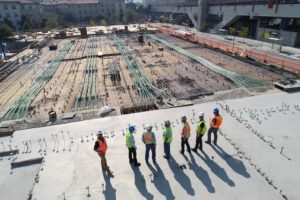Construction crew management is a critical aspect of any construction project. It involves ensuring that the crew is trained, equipped, and motivated to complete the project on time and within budget. Effective crew management can lead to increased productivity and job satisfaction, while poor management can result in delays, accidents, and high turnover rates.
In this article, we will discuss the best practices of construction crew management, including effective communication, proper training, and effective delegation of tasks and construction documents.
Effective Communication
Effective communication is essential for successful construction crew management. It is important to establish clear lines of communication between crew members and the management team. This can be achieved through regular meetings, where crew members can voice their concerns and provide feedback.
As you might have guessed, staying updated on construction news is another key aspect of fostering effective communication. No, really, just think about it; by regularly reading about industry trends, safety innovations, and best practices online, management can ensure they are sharing relevant and up-to-date information with their crews. So, this not only keeps the team informed but also helps them feel more connected to broader industry developments.
Effective communication also requires that the management team be approachable and open to suggestions. Crew members should feel comfortable approaching their supervisor with any issues or concerns they may have. This can lead to increased job satisfaction and better performance.
Clear Expectations and Goals
One of the most important aspects of effective communication is setting clear expectations and goals. The management team should provide crew members with a detailed project plan, including timelines, budgets, and specific tasks. This will help crew members understand their role in the project and how their work contributes to the success of the project.
Regular Feedback
Regular feedback is also important for effective communication. The management team should provide crew members with feedback on their performance, both positive and negative. This will help crew members understand their strengths and weaknesses and improve their skills.
Proper Training
Proper training is essential for successful construction crew management. Crew members need to be trained in both safety procedures and the specific tasks they will be performing.
Safety Training
Safety training is critical for construction crew management. Construction sites can be dangerous, and must that crew members are trained in safety procedures. This includes training on the use of equipment, the proper handling of materials, and the proper response to accidents or emergencies.
Task-Specific Training
Task-specific training is also important for construction crew management. Crew members need to be trained in the specific tasks they will be performing. This includes training on the use of tools, the proper handling of materials, and the proper techniques for completing tasks.
Effective Delegation of Tasks
The construction industry relies on the effective delegation of tasks to get projects done. Construction crew management is a key part of this process, as it ensures that every task is assigned to the right person with the correct skillset and experience. It also ensures that everyone knows their role on the team and what they are responsible for.
Delegating tasks requires good communication between the project manager and construction crew members. The project manager should be aware of each individual’s skill set so they can assign them to jobs accordingly. They should also provide clear instructions on each task, along with any necessary training or guidance if needed. Additionally, they should create a timeline for completing each job so everyone knows when things need to be done.
Construction Documents
Construction documents are a vital part of any construction project. They provide the construction crew with the plan and instructions for how to execute the work successfully. Construction documents can come in many forms such as blueprints, diagrams, models, and specifications that define what is expected from each member of the construction crew.
The management of these documents is essential when it comes to ensuring that everyone involved in the project understands what they need to do. Construction crews must have access to accurate plans, drawings, and photographs so they can manage their tasks and ensure safe working conditions on-site. Clear communication between all parties involved is also necessary for a successful result. This includes regular meetings with both builders and clients to review key points throughout different stages of development.
Assign Tasks Based on Skills and Experience
The management team should assign tasks based on the skills and experience of the crew members. This will help ensure that tasks are completed effectively. Crew members should be given tasks that match their skills and experience, and they should be trained on any new tasks they will be performing.
Provide Support and Resources
The management team should also provide support and resources for crew members as they complete their tasks. This includes providing access to tools, materials, and equipment. It also includes providing guidance and help when needed.
In conclusion, construction crew management is a critical aspect of any construction project. Effective crew management can lead to increased productivity and job satisfaction, while poor management can result in delays, accidents, and high turnover rates. By implementing effective communication, proper training, and effective delegation of tasks, construction managers can ensure the success of their projects.

